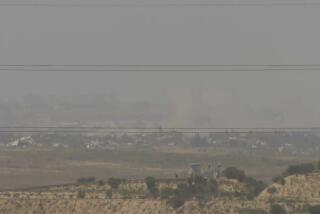Iraq Cuts CNN Telephone Link With U.S. : Media: Security reasons were cited for severing the line used by reporters delivering eyewitness accounts of the outbreak of war.
NEW YORK — Iraqi officials today cut CNN’s phone link with the United States, ending the live reports from Baghdad on the outbreak of war and air attacks that began there before dawn today.
CNN reporters Peter Arnett and John Holliman, who with anchor Bernard Shaw have helped CNN lead its rivals in Baghdad with eyewitness reporting, said Iraqi officials had warned earlier that their service would be cut.
“I hope we can resume our reports in the very near future,” Arnett said as the line went dead at 8 a.m. California time. He and his colleagues said that officials cited security reasons but that CNN might be able to later send taped reports that would be subject to censorship.
The network’s reports from Baghdad have been seen worldwide and were cited at a news conference earlier today by Gen. Colin L. Powell, chairman of the U.S. Joint Chiefs of Staff.
Iraq allowed CNN alone of the networks a 24-hour line. NBC said its phone line to correspondent Tom Aspell also shut down. The same happened to ABC and CBS correspondents in the Iraqi capital.
When U.S. warplanes brought Operation Desert Storm to Iraq’s capital shortly after 2:30 a.m. today Baghdad time, television viewers got eyewitness accounts--but no video--from U.S. reporters holed up in a downtown hotel.
“This feels like we’re in the center of hell,” Shaw said by telephone from the Al-Rashid Hotel, while bright red streams of anti-aircraft tracer fire arced skyward at invisible attackers.
At first, it seemed almost like a war designed for television, with the first reports of “flashes in the sky” of the enemy capital coinciding with U.S. evening newscasts.
But Iraq would transmit no TV pictures.
This was perhaps the first war Americans have reported from an enemy’s capital with the help of the foe. CNN said Iraqi security confiscated 90 minutes of its footage of the Baghdad attack, yet later released the tape.
The first U.S. pool video, cleared by U.S. military officials, aired about 12:30 a.m. EST and showed night scenes from an unidentified air base in Saudi Arabia. The networks and CNN aired most pool video raw and unedited.
By 3 a.m., the pool was interviewing pilots who had returned from sorties over Iraqi positions, where they reported little resistance.
Overnight, all four broadcasters showed raw pool videotape, including cruise missile launches from the battleship Wisconsin.
For the moment, CNN’s Baghdad footage was useless because Iraqi phone ties to an Amman, Jordan, satellite “uplink” had been severed, Holliman said.
“We apologize for the problems we’re having with Iraqi television in getting this material to you,” Holliman said, perhaps conscious of the irony. “I’m sure they’re trying to do what they can to get the pictures out.”
Outside Iraq, network correspondents reported from Israel, Jordan, and their Saudi Arabian base in Dhahran, where satellite transmissions were briefly interrupted early in the hostilities.
None of the U.S. network crews in Baghdad were reported injured, despite bomb blasts near their hotel.
NBC said it was expanding “NBC Nightly News” to an hour for the duration of the Persian Gulf crisis, and all three networks said they would broadcast continuous coverage of the war for as long as developments warrant it.
More to Read
The biggest entertainment stories
Get our big stories about Hollywood, film, television, music, arts, culture and more right in your inbox as soon as they publish.
You may occasionally receive promotional content from the Los Angeles Times.










